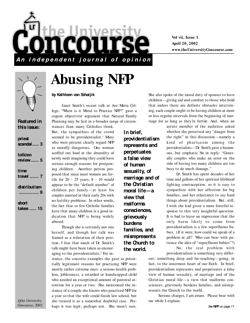It’s not the Vatican, it’s the laity
by Kathleen van Schaijik
Mark Fischer is right when he says (in his page 3 article) that the scandal unfolding in the Church these days is different from scandals past. There is an altogether new kind of consciousness among the faithful. We are appalled not only by the discovery that so many priests have committed such unspeakable crimes, but even more that the hierarchy is implicated in a massive and unpardonable cover-up. Adding to our dismay is the lameness of clerical response to the revelations, even among cherished conservative stalwarts.
Lay Catholics across the board seem united in their conviction that something dramatic needs to be done. In her March 22, 2002 column for The Wall Street Journal, Peggy Noonan (like Mark Fischer) calls on the Vatican to act:
“For the first time in my lifetime ardent Catholics, or perhaps I should say orthodox Catholics, no longer trust their cardinals and bishops to do what’s right. They have pinned their hopes on the Vatican, and on the old warrior saint, JPII. They want him to hold up his silver crosier with the crucified Christ on the top and demand that priests who seduce teenage boys—or who sexually abuse, molest or seduce anyone—be thrown from the church, and that their protectors, excusers and enablers be thrown from it too.”
But may I venture a doubt that even our beloved pope can do much this time?
Does anyone imagine that this problem isn’t every bit as bad and widespread in the European hierarchy as it is in ours? Is it not rather all too likely that there are powerful Vatican officials who are guilty of similar sins and cover-ups? And if this has been going on not just for years, but for decades and centuries, then we should realize that the pope cannot crack down without risking a destabilization of the institutional structure of the Church and a disastrous undermining of her interests in the world. (Goodbye moral authority at UN conferences, to name just one relatively miniscule item.)
Then, too, just think what a horrible position faithful priests, bishops and cardinals must be in these days. Though they may be innocent of crimes, I don’t suppose there are many among them who are innocent of knowledge of such things. Remember the seal of confession. Consider the innumerable personal obligations and debts of friendship they must have with one another, making it virtually impossible for them to speak out. Think how acutely conscious every holy pastor must be of his own sins, and the unsuitability of his being the one to begin casting stones.
For these reasons and others, my own hopes (which are high) are not pinned on the Vatican. They are pinned on the laity. It is the laity who must act in this case. It is we who must insist on reform, and lead the charge in implementing it.
This scandal has uncovered a destructive residual clericalism in the Church (priests and bishops acting like a secret fraternity—protecting and promoting one another at the expense of the welfare and dignity of the laity) that must be decisively overcome if the Church is to realize the vocation laid out for her in the Second Vatican Council.
There are functions that only priests and bishops can fulfill. No layman can say mass or absolve sins or ordain priests. But—this is a real question, not a rhetorical one—is there any reason why we cannot have a more substantial role than we do now in, for example, the selection of candidates for the priesthood, and in the operating of seminaries and diocesan offices? Even a greater presence in seminaries—in teaching or administrative positions—might have a wholesome effect. (Recall that not so long ago lay Catholics were thought to have no place in the running of universities or the teaching of theology.)
One Harvard professor, who is a parishioner in the Boston area, is asking local Catholics to withhold donations to the archdiocese until there has been a much more thorough accounting of the scandal (e.g., where is the $30,000,000.00 due now to Geoghan’s victims going to come from?) This seems to me a good beginning.
Let’s put our heads together and see if we can’t come up with more.
Kathleen van Schaijik


